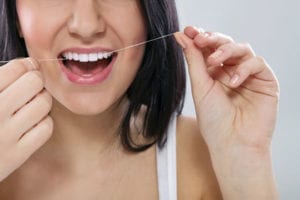While brushing and flossing may seem more like a routine habit you’ve become accustomed to doing, good oral hygiene is actually essential right now. Your mouth is an entry point for microorganisms that cause disease, including coronavirus, so the health of your mouth, gums, and teeth can affect your overall health.
Why Good Oral Health Matters

Recent studies indicate that maintaining good oral health during coronavirus “may prevent a severe course of the disease,” according to Prof. Roland Frankenberger, president of the German Society of Dentistry and Oral Medicine (DGZMK). He goes on to state that, “in the context of the COVID-19 pandemic, dentistry has a particularly important role to play in keeping the oral cavity healthy.”
According to Frankenberger, a healthy mouth acts as a barrier against all kinds of diseases, and this is also true for COVID-19. He also explains recent data that shows more fatal cases of COVID-19 in areas where the lack of oral hygiene causes diseases such as caries or periodontitis.
How can you protect your oral health and minimize your risk of more severe diseases?
In addition to the recommended CDC (Centers for Disease Control and Prevention) measures to protect you and others from COVID-19, here are five oral care practices you can include in your daily regimen:
1. Brush and floss daily
Keep your mouth healthy by brushing your teeth twice daily with a soft-bristled brush using fluoride toothpaste. And don’t forget to floss. Flossing daily contributes to good dental hygiene by lifting and removing plaque and food from between your teeth. This combination will help keep your mouth as clean as possible.
2. Don’t share dental hygiene products
You probably would cringe at the thought of sharing your toothbrush with anyone else—even family. Doing so puts you at risk for candidiasis, an oral yeast infection also called thrush, which can be spread easily via a toothbrush.
But don’t stop there. Help minimize transferring germs even further by having your own roll of floss and tube of toothpaste. Since we’re in the midst of a viral outbreak, it’s best to avoid cross-contamination as much as possible. Anything you handle with your hands and then put into your mouth should not be shared.
3. Regularly clean your toothbrush and replace after sickness
It’s not a pleasant thought, but the bristles of your toothbrush can be a breeding ground for bacteria. And because most people are on high alert right now, it’s a good idea to rinse your toothbrush with hydrogen peroxide daily to keep the bristles clean. Be sure to replace your toothbrush every three months or immediately after recovering from sickness.
4. Limit sugary foods
Another way to maintain good oral health is to eat a balanced diet with plenty of vegetables, fruits, whole grains, and low-fat dairy products. As much as possible, avoid excessive snacking and limit your intake of sugary products. Foods high in sugar or starch tend to stick to your teeth.
5. Stay hydrated
Adequate hydration is also important for good dental health. Water is a great cleanser for your mouth because it washes away leftover food and residue that cavity-causing bacteria love to eat. Keep your mouth healthy by drinking plenty of water every day.
